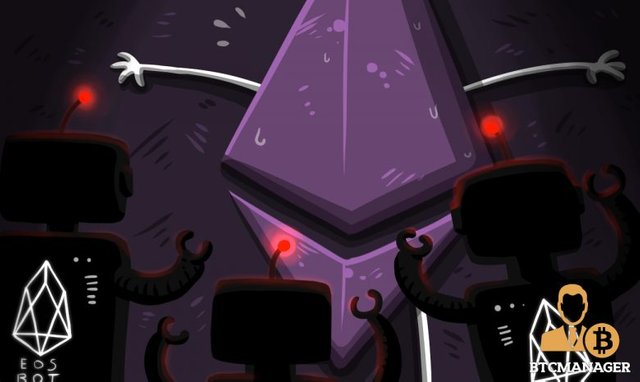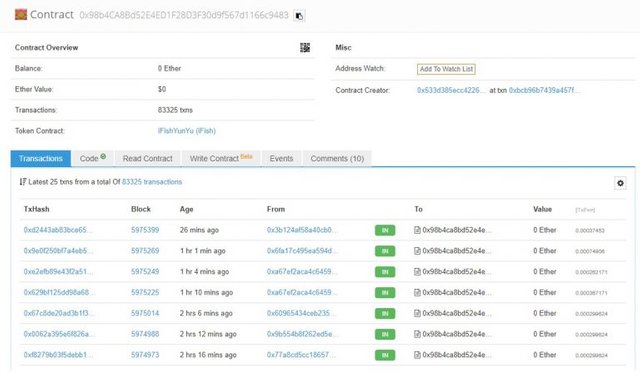EOS Funded Bot Accounts Allegedly Congested Ethereum Network

A discussion on July 15, 2018, within the largest online Ethereum community, the Ethereum Subreddit (r/Ethereum), claimed that EOS-funded bot accounts have been deliberately clogging up the Ethereum blockchain network, spending up to 50 ether every hour for over 24 hours.
EOS Controversy
An alleged 40 percent of the capacity of the Ethereum blockchain network was utilized to process the transactions of one smart contract, operated by iFishYunYu (iFish). The contract was replicated by an unknown group of developers, copying the original codebase of a default ERC20 token standard token called iFishYunYu. The token itself has no purpose and functionality, and it indeed does not have a large active user base that is capable of congesting the network.
The iFish token contract accounted for the vast majority of Ethereum’s blockchain network capacity throughout the past 24 hours, with a massive amount of transactions initiated by so-called “unique” accounts.
The situation worsened as five billion iFish tokens stored by the smart contract demonstrated above began to split across ten accounts, creating 500 to 600 accounts each. The unexpected creation of hundreds of ether accounts equipped with millions of iFish tokens clogged up the network even more, driving gas costs and transaction fees up.

Team JUST, a crypto Discord server operated by popular Ethereum-based decentralized application (dApp) developers, discovered that one of the accounts that had been sending a significant chunk of ether to the iFish token contract to cover gast costs, held hundreds of thousands of crowdfunded EOS, or EOS that was obtained from its initial coin offering (ICO).
“That sure is a lot of crowdfunded EOS, hundreds of thousands to be exact. From an account that seems to receive large sums of [EOS] and immediately market sell them for thousands of ETH, which is then distributed out to contracts like this. Contracts that have been pulling this kind of transaction attack consistently across the ETH network,” one member of Ethereum Reddit said, echoing the findings of team JUST.
Core developers of EOS, Block.one, and the EOS community have not responded to the claims brought up by team JUST, and it remains uncertain whether EOS inflated the iFish token contract to clog up the Ethereum network or a group independent of EOS is responsible for the actions.
Either way, the motive behind iFish and the split of hundreds of accounts was clearly to congest the main Ethereum blockchain network, with the intent of creating a challenging environment for both dApp developers and users by increasing gast costs.
Post-FCoin Scandal
Throughout the past two weeks, China-based crypto exchange FCoin has been heavily criticized by industry experts for congesting the Ethereum network with needless transactions.
The team behind MyCrypto, a widely utilized open-source Ethereum wallet, condemned FCoin for initiating airdrops to select digital assets to list on its platform instead of internal surveys that are evidently sufficient to achieve consensus amongst developers and the users of the platform.
The MyCrypto team said:
“Basically, they want their users to ‘vote’ for tokens to be listed. Instead of a traditional voting mechanism (like, I dunno, a fing poll on their fing exchange?!) they have decided to vote via ‘cumulative deposit number ranking.’”
For over a month, Ethereum, the second most valuable and the most actively utilized public blockchain network, has been congested and essentially crippled by bad actors in the space whose primary motive is to decelerate the growth and adoption of blockchain technology.
nice post